Daily Vocabulary Words: List of Daily Used Words
Hi there. Welcome to this special section @ Wordpandit.
Our endeavour here is straightforward: highlighting important daily vocabulary words, you would encounter in The Hindu. This is your repository of commonly used words; essentially, we are posting a list of daily used words. Hence, this has significant practical application as it teaches you words that are commonly used in a leading publication such as The Hindu.
Visit the website daily to learn words from The Hindu.
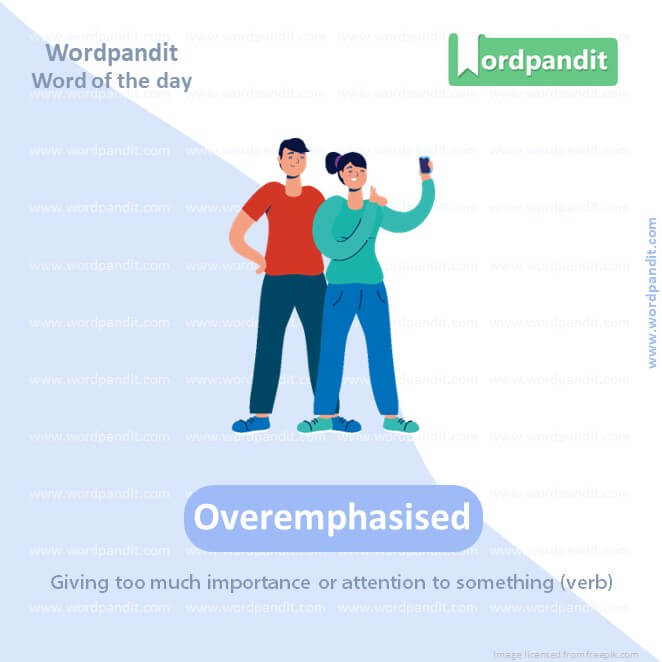
WORD-1: Overemphasised
CONTEXT: In Viksit Bharat, economic development is overemphasised. But post-developmentalists argue that this is a Euro-centric notion of development which reflects the interests of its practitioners.
SOURCE: The Hindu
EXPLANATORY PARAGRAPH: Imagine telling a story about a small spider but acting like it’s as big as a car. That’s overemphasising. It means making something seem more important or bigger than it really is.
MEANING: Giving too much importance or attention to something (verb).
PRONUNCIATION: oh-ver-em-fuh-syzd
SYNONYMS: Exaggerated, Overstated, Overplayed, Magnified, Overdone, Hyperbolized
USAGE EXAMPLE:
1. The importance of the test was overemphasised by the teacher.
2. He overemphasised his role in the project.
3. The media often overemphasises celebrity news.
4. She felt the risks were overemphasised.
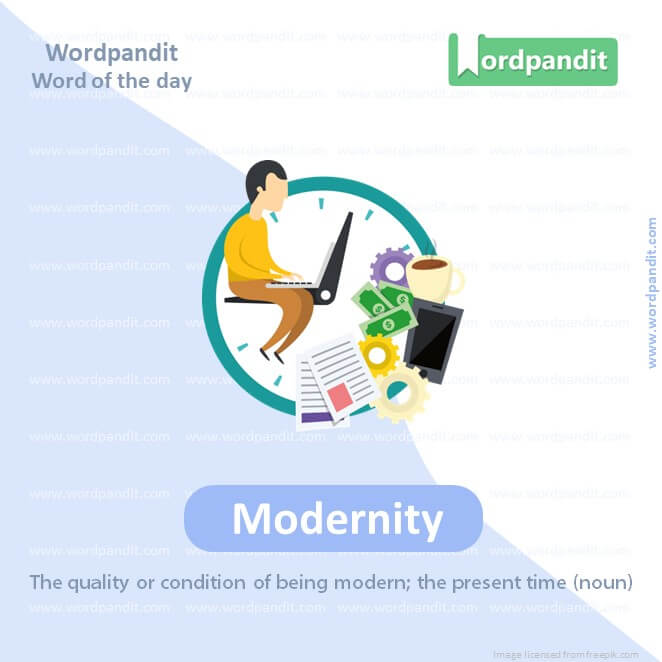
WORD-2: Modernity
CONTEXT: Critics of development have consistently raised concerns about the conventional models of economic growth, challenging the contentious notions surrounding modernity and progress.
SOURCE: The Hindu
EXPLANATORY PARAGRAPH: Modernity is like when you see buildings with cool designs or new phones with lots of features. It’s about things that are new, recent, or like what we have today.
MEANING: The quality or condition of being modern; the present time (noun).
PRONUNCIATION: moh-dur-ni-tee
SYNONYMS: Newness, Contemporariness, Currentness, Novelty, Recentness, Present-day
USAGE EXAMPLE:
1. The city skyline was a symbol of modernity.
2. He struggled to keep up with the pace of modernity.
3. Modernity has transformed the way we communicate.
4. The museum was dedicated to the art of modernity.
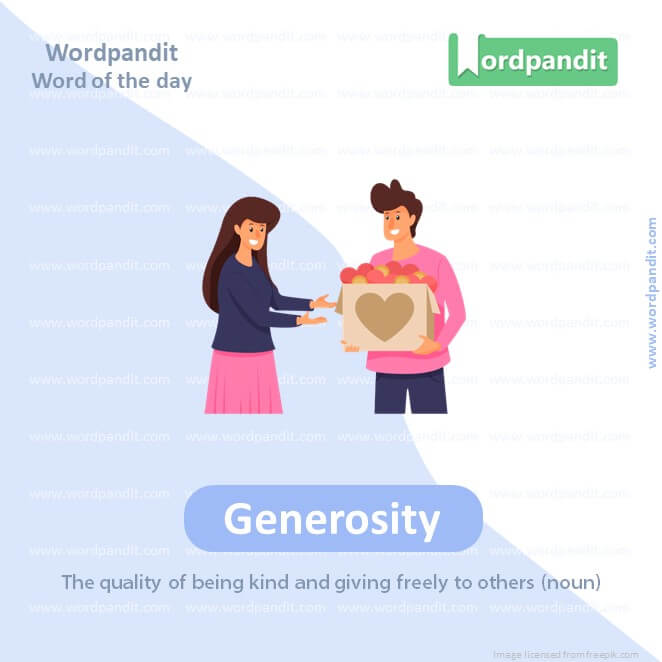
WORD-3: Generosity
CONTEXT: The happiness matrix includes six variables: GDP per capita; healthy life expectancy at birth; generosity; social support; freedom to make life choices, and perception of corruption.
SOURCE: The Hindu
EXPLANATORY PARAGRAPH: Generosity is like when you share your favorite toy with a friend. It means being kind and giving to others, like sharing or helping.
MEANING: The quality of being kind and giving freely to others (noun).
PRONUNCIATION: jen-uh-ros-ih-tee
SYNONYMS: Kindness, Bigheartedness, Altruism, Benevolence, Magnanimity, Liberality
USAGE EXAMPLE:
1. Her generosity was known throughout the community.
2. They donated to the charity out of generosity.
3. His generosity in sharing his lunch was appreciated.
4. The fundraiser was a success thanks to the generosity of the donors.
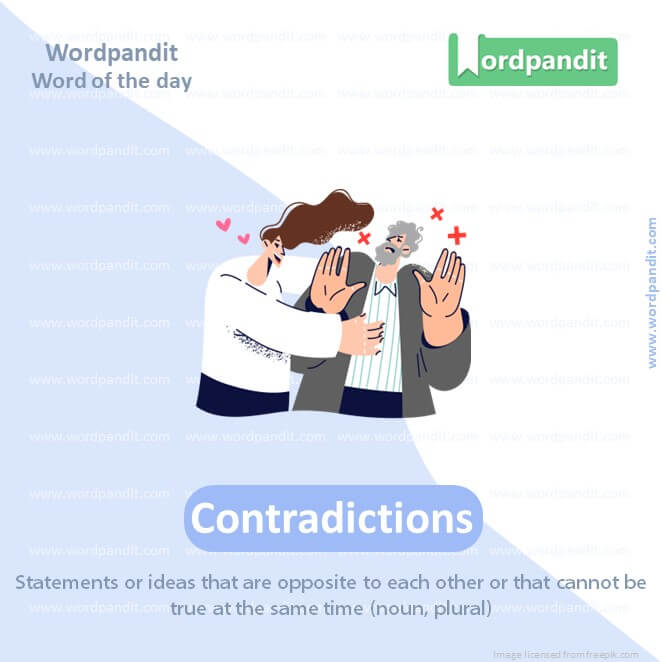
WORD-4: Contradictions
CONTEXT: All aspects of life in this development cycle do not change simultaneously, creating imbalances and contradictions.
SOURCE: The Hindu
EXPLANATORY PARAGRAPH: Contradictions are like saying it’s raining outside when it’s actually sunny. It’s when two things are said or happen that don’t match or can’t be true at the same time.
MEANING: Statements or ideas that are opposite to each other or that cannot be true at the same time (noun, plural).
PRONUNCIATION: kon-truh-dik-shuhns
SYNONYMS: Inconsistencies, Paradoxes, Discrepancies, Conflicts, Opposites, Anomalies
USAGE EXAMPLE:
1. The witness’s story was full of contradictions.
2. He was confused by the contradictions in the rules.
3. The theory was criticized for its many contradictions.
4. The book explores the contradictions of human nature.
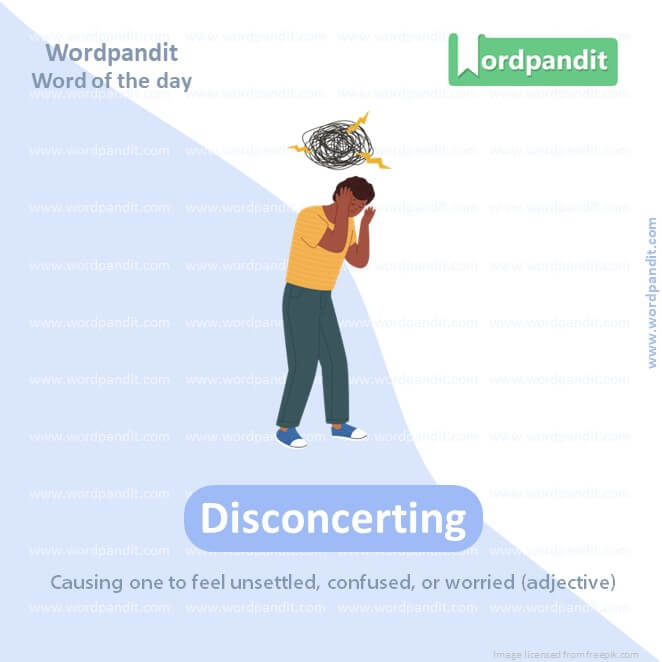
WORD-5: Disconcerting
CONTEXT: What is even more disconcerting is that the victims ranged from a 13-year-old to middle-aged individuals, dispelling the myth that heart-related issues primarily afflict the elderly.
SOURCE: The Hindu
EXPLANATORY PARAGRAPH: Disconcerting is like feeling weird when your favorite color suddenly changes in a game. It means something makes you feel confused, surprised, or uncomfortable.
MEANING: Causing one to feel unsettled, confused, or worried (adjective).
PRONUNCIATION: dis-kuhn-sur-ting
SYNONYMS: Unsettling, Disturbing, Alarming, Discomfiting, Troubling, Perturbing
USAGE EXAMPLE:
1. The strange noise was disconcerting.
2. His sudden change in attitude was disconcerting.
3. She found the empty streets at night disconcerting.
4. It was disconcerting to see the changes in the town.
WORD-6: Predisposition
CONTEXT: This epidemic is further spurred by factors including a genetic predisposition towards conditions such as diabetes and heart disease, and a sedentary lifestyle, which also brings with it issues such as stress, anxiety, and depression.
SOURCE: The Hindu
EXPLANATORY PARAGRAPH: A predisposition is like having a favorite flavor of ice cream before you even taste the others. It means having a liking, tendency, or habit for something before trying other things.
MEANING: A natural tendency to behave in a particular way or to develop a particular condition (noun).
PRONUNCIATION: pree-dis-puh-zish-uhn
SYNONYMS: Inclination, Tendency, Proclivity, Bias, Penchant, Propensity
USAGE EXAMPLE:
1. He had a predisposition to be shy.
2. Her predisposition for music was evident early on.
3. The family had a genetic predisposition to the illness.
4. His predisposition towards kindness was well-known.
WORD-7: Proactive
CONTEXT: We need to change our attitude from ‘it’s better not to know’ to ‘it’s best for me to be proactive so that I can overcome it’.
SOURCE: The Hindu
EXPLANATORY PARAGRAPH: Being proactive is like putting on your raincoat before it starts raining. It means doing something now to prevent problems or to get ready for something before it happens.
MEANING: Taking action by causing change and not only reacting to change when it happens (adjective).
PRONUNCIATION: proh-ak-tiv
SYNONYMS: Preventative, Anticipatory, Forward-thinking, Initiatory, Preemptive, Preparatory
USAGE EXAMPLE:
1. They took a proactive approach to improve their health.
2. Being proactive helped him succeed in his career.
3. The teacher was proactive in preventing bullying in her class.
4. The company’s proactive stance on environmental issues was praised.
WORD-8: Embracing
CONTEXT: By embracing sustainable healthy habits today, we commit to making healthier choices for 365 days and beyond.
SOURCE: The Hindu
EXPLANATORY PARAGRAPH: Embracing is like giving a big, warm hug to someone or something. It means accepting or holding something close because you really like it or believe in it.
MEANING: Accepting or supporting something willingly and enthusiastically (verb).
PRONUNCIATION: em-bray-sing
SYNONYMS: Accepting, Welcoming, Adopting, Endorsing, Incorporating, Clasping
USAGE EXAMPLE:
1. She is embracing new challenges in her job.
2. The community is embracing cultural diversity.
3. He was embracing the opportunity to learn.
4. Embracing change can be difficult but rewarding.
WORD-9: Resonating
CONTEXT: It is a call-to-action resonating with the belief that the strength of a nation is rooted in the vitality of its people.
SOURCE: The Hindu
EXPLANATORY PARAGRAPH: Resonating is like when you hear your favorite song and feel really happy inside. It means something is meaningful or special to you in a way that you can strongly feel or relate to.
MEANING: Evoking a strong or positive reaction, understanding, or sympathy; having an effect or impact (verb).
PRONUNCIATION: rez-uh-nay-ting
SYNONYMS: Echoing, Reverberating, Ringing, Mirroring, Reflecting, Vibrating
USAGE EXAMPLE:
1. Her speech resonated with the audience.
2. The story resonated with his personal experiences.
3. The movie’s theme resonated among many viewers.
4. The idea resonated with the team.
WORD-10: Abrogation
CONTEXT: The appointment of the Chief Election Commissioner; and three, by completely displacing rules, such as in the abrogation of Article 370 (in Jammu and Kashmir).
SOURCE: The Hindu
EXPLANATORY PARAGRAPH: Abrogation is like when a rule in a game is removed, and you don’t have to follow it anymore. It means officially ending or cancelling a law, agreement, or rule.
MEANING: The act of formally ending or cancelling something, such as a law, agreement, or practice (noun).
PRONUNCIATION: ab-ruh-gay-shuhn
SYNONYMS: Cancellation, Annulment, Repeal, Revocation, Nullification, Rescission
USAGE EXAMPLE:
1. The abrogation of the treaty caused controversy.
2. The law was met with abrogation by the new government.
3. The company faced criticism for the abrogation of the policy.
4. He argued for the abrogation of outdated regulations.
Vocabulary Exercises
In the language learning fitness regime, ‘vocabulary exercises’ are vital workouts that flex cognitive muscles. These exercises help reinforce new vocabulary, enhance memory, and promote active application. However, to reap the full benefits of ‘vocabulary exercises’, it’s crucial to tackle them with the right strategy and mindset.
To begin with, when approaching ‘vocabulary exercises’, it’s important to view them as opportunities to explore words’ usage. Completing these exercises isn’t simply about ticking off correct answers; it’s about deepening the understanding of the words in various contexts which aids in their active usage.
Leveraging technology can greatly enhance the efficiency of ‘vocabulary exercises’. Digital apps often provide a wide range of ‘vocabulary exercises’ that range from fill-in-the-blank exercises to match-the-column tasks. These digital platforms offer instant feedback and keep you engaged while turning learning into an interactive experience.
Incorporating ‘vocabulary exercises’ in your daily learning routine helps consolidate your vocabulary knowledge. Set aside specific time slots every day to commit to these exercises. Regular revisions steps up retention and keep the learning curve ascending.
Personalizing ‘vocabulary exercises’ also proves beneficial. This could involve creating your own sentences using the learnt vocabulary or drawing visuals that associate with each word. These personalized exercises stimulate more profound learning and enhance the recall ability.
To conclude, ‘vocabulary exercises’ are essential tools in your language learning toolkit. They provide a platform for active learning, promote better recall, and, when paired with technological tools, make learning more engaging and effective. Furthermore, incorporating these exercises into your daily routine and personalizing them heightens their impact. Remember, ‘vocabulary exercises’ are not merely tasks, they are stepping stones guiding you towards your language mastery goals.











